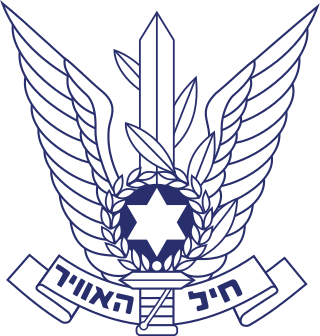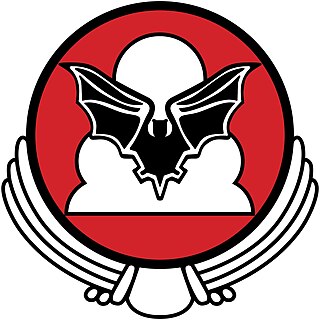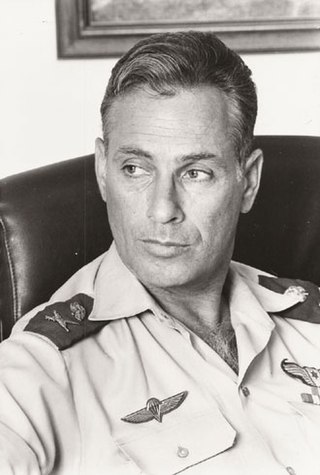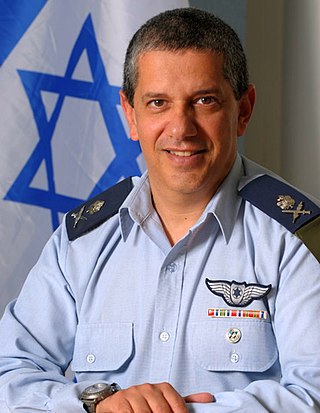
The Israeli Air Force operates as the aerial and space warfare branch of the Israel Defense Forces (IDF). It was founded on May 28, 1948, shortly after the Israeli Declaration of Independence. As of April 2022, Aluf Tomer Bar has been serving as the Air Force commander.

The 69 "Hammers" Squadron is an Israeli Air Force squadron operating the F-15I Thunder out of Hatzerim. It was formed in July 1948 to operate three B-17 Flying Fortresses which the fledgling Israeli Air Force had acquired in the United States. The squadron flew the Flying Fortress, an aircraft credited with propelling the IAF into the realm of modern aerial warfare, during both the 1948 Arab–Israeli War and 1956 Suez Crisis. Disbanded in early 1957, 69 Squadron reformed in 1969 to fly the F-4 Phantom II.

Hatzor Airbase, also titled Kanaf 4 is an Israeli Air Force (IAF) base, located in central Israel near kibbutz Hatzor Ashdod after which it is named. However, there have been no fighter jets stationed there since 2021, only patrol aircraft, UAVs and defense missiles. A Combined Operations Center for the US military and Israel has also been built there in 2021.

Ramat David Airbase is an Israeli Air Force (IAF) base located 20 km southeast of Haifa in the Northern District of Israel, close to kibbutz Ramat David in the Jezreel Valley. It is the northernmost IAF base in Israel with fighter jets, UAVs and helicopters based on it. There is an ongoing debate about whether Ramat David should be converted into an international airport.

Tel Nof Airbase, also known as Air Force Base 8, is the oldest and main base of the Israeli Air Force (IAF) located 5 km south of Rehovot, Israel. Tel Nof houses two strike fighter, two helicopter and a UAV squadron. Also located on the base are the Flight Test Center Manat and several special units of the Israel Defense Forces (IDF), among others Unit 669 and the Paratroopers Brigade training center and its headquarters.

Hatzerim Airbase is an Israeli Air Force (IAF) base on the northern edge of the Negev desert in the Southern District of Israel, 6 km west of Beersheba, near kibbutz Hatzerim. Apart from operational fighter jets, it houses the IAF Flight Academy, the IAF Aerobatic Team and the IAF Museum.

Squadron 107, also known as the "Knights of the Orange Tail Squadron", is a fighter aircraft squadron in the Israeli Air Force. The squadron operates F-16I ("Sufa") aircraft from the Hatzerim Airbase in the Negev.

The Ofira Air Battle was one of the first air battles of the Yom Kippur War. On 6 October 1973, Egypt launched a massive surprise attack on Israel that included over 200 Egyptian aircraft participating in an opening airstrike. The Israeli Air Force (IAF) Base Ofira at Sharm el-Sheikh came under attack by 20 Egyptian Air Force MiG-17s and their eight MiG-21 escorts. Not realizing the extent of the attack, Israel quickly scrambled two F-4E Phantom II fighter jets. The Israeli pilots proceeded to jettison their external fuel tanks and engage all 28 MiGs in aerial combat. In just under six minutes, seven Egyptian MiGs had been shot down and the remaining Egyptian planes disengaged and returned to Egypt. The Israeli Phantoms returned to their base. The Egyptians dispute the Israeli account of the battle, but they never did provide their own version of what happened. One of the Egyptian pilots killed was Egyptian President Anwar Sadat's half-brother, Atef.

119 Squadron of the Israeli Air Force, also known as the Bat Squadron, is an Lockheed Martin F-16I Sufa fighter squadron based at Ramon Airbase.

Avihu Ben-Nun was the 11th commander of the Israeli Air Force between 1987 and 1992.

115 Squadron, also known as the Flying Dragon or Red Squadron, is the Israeli Air Force's aggressor squadron. Based at Ovda, it is the sole IAF squadron to operate fixed-wing aircraft, helicopters and ground-based assets.

Giora Romm was an Israeli military officer who served as deputy commander of the Israeli Air Force (IAF), Israel's military attaché in the United States and as director of the Civil Aviation Authority of Israel. Romm was the IAF's first jet ace, scoring five kills during the 1967 Six-Day War. In 1969, during the War of Attrition, Romm was shot down and spent several months in Egyptian captivity. He commanded the IAF's 115 Squadron through the intensive fighting of the 1973 Yom Kippur War and participated in Operation Wooden Leg, the 1985 raid against PLO headquarters in Tunisia.

Amir Nachumi is a retired Israeli Air Force Brigadier General who, in the course of his career, shot down 14 enemy aircraft, making him one of Israel's top flying aces. He scored 7 aerial kills in the F-4 Phantom II during the Yom Kippur War, 7 in the F-16 Fighting Falcon in fighting over Lebanon, and participated in Operation Opera, the 1981 raid that destroyed an Iraqi nuclear reactor.

The 1973 Syrian General Staff Headquarters Raid was an aerial strike carried out by the Israeli Air Force on October 9, 1973, the fourth day of the Yom Kippur War. Following a strike by Syrian surface-to-surface missiles against settlements and installations in northern Israel, seven F-4 Phantom IIs from 119 Squadron attacked the Syrian General Staff Headquarters (GHQ) and adjacent buildings in downtown Damascus.

147 Squadron, often referred to as the Flying Ibex or Goring Ram squadron, is a former unit of the Israeli Air Force. Fielding IAF Flight Academy aircraft, it flew the Boeing-Stearman Kaydet during the 1956 Suez Crisis and the Fouga Magister during the 1967 Six-Day War, in the course of which it suffered six fatalities. Between 1978 and 1986 it flew the A-4 Skyhawk.

Amir Eshel is a former Israeli general who served as commander of the Israeli Air Force and served as Director General of the Israeli Ministry of Defense until January 2, 2022.

149 Squadron, often referred to as the Smashing or Shattering Parrot squadron is a former unit of the Israeli Air Force. Active from 1976 to 1991, the squadron flew the A-4 Skyhawk and IAI Kfir.

Aluf Amikam Norkin is a retired Israeli general, who served as commander of the Israeli Air Force (IAF) from 2017 to 2022. Before his selection to succeed Amir Eshel as commander of the IAF, Norkin served as head of the IDF Planning Directorate.

Rami Harpaz was a colonel in the Israel Defence Forces and a prisoner of war during the War of Attrition. Harpaz served as a fighter pilot in the Israeli Air Force (IAF) and spent three and a half years in an Egyptian prison. Following his release, he returned to the Air Force, and came to command the IAF base at Ramat David.





















